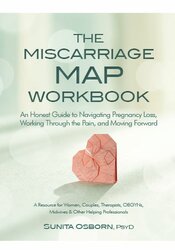Mourning Together, but Differently
Healing Your Relationship After Pregnancy Loss

After pregnancy loss, it is not uncommon for a couple’s relationship satisfaction to decline, putting them at a higher risk for separation. This is because pregnancy loss is a trauma, and any traumatic event can disturb the foundation of even the strongest and healthiest of couples. At the same time, the experience of miscarriage does not unequivocally lead to a decay in the relationship. For some couples, the loss may indeed highlight existing fractures in their relationship, but for others, it creates an opportunity to more deeply understand their partner and their relationship.
Whether a miscarriage stimulates growth or stifles it depends on a variety factors, including how each partner reacts to the loss. For example, some couples may struggle following the loss due to differing expectations regarding how each partner “should” be grieving. After a miscarriage, we generally look to our partner as the one person in the world who truly “gets it” in a way that no one else can because they are experiencing the same loss we are. We expect them to be just as sad, bitter, or confused as we are. However, as with any other stressor or major life event, our partner may respond very differently to the experience of pregnancy loss. That is because the manner in which we process trauma varies as a function of our backgrounds, personalities, cultures, and unique ways of viewing the world. Therefore, while both partners will have their own emotional reactions to this loss, this may differ—and differ wildly.
For example, one partner may feel furious and betrayed by her body or the world, while another may just feel devastatingly numb. One may want to share their feelings with any passing stranger, while another may become withdrawn and reticent. Moreover, gender role stereotypes play a role in shaping how we believe men versus women “should” react in the face of difficulty. Women are reinforced for expressing their emotions, so they more often express grief with outward displays of sorrow. Men, on the other hand, are encouraged to hide their feelings and remain stoic in the face of tragedy, so in times of crisis or grief, they are more likely assume the “fixer” role. These contrasting ways of responding can lead to disconnection and conflict as one partner may wonder, “How you are not as devastated as I am?” while the other partner feels overwhelmed and alone in taking responsibility for the family. Though these reactions may appear different on the surface, this is not to say that each partner is not grieving in their own way.
To gain greater perspective on how your partner is grieving and to develop greater understanding regarding their experience, try completing the . The point of this exercise is not to perfectly guess what your partner is experiencing but to offer you the opportunity to further delve into their reaction and to hopefully increase your sense of compassion and connection toward them. If it’s helpful, you can read the entire story to your partner or, alternatively, you can share some realizations you developed from this exercise (e.g., “I realized that I often told you that you weren’t saying the ‘right’ things or that I needed you to act differently. I imagine that was really confusing for you”).
Maybe your reflections or guesses will be spot-on, or perhaps you will make interpretations that were not your partner’s experience at all. For most of us, it is not the accuracy of someone else’s questions or comments that matter to us, but their intentions in getting to know us. Therefore, your intention to truly understand your partner’s experience can go a long way in reconnecting you or strengthening your relationship.
Learn more about navigating the grief and loss surrounding a miscarriage in Dr. Osborn's next blog: Finding Your Rainbow.
You can find more information on how to move forward from the trauma and grief surrounding pregnancy loss in .
*This is an adapted excerpt from The Miscarriage Map Workbook by Sunita Osborn, PsyD. Copyright ¬© 2021, Sunita Osborn. ∞≈¿÷ ”∆µ Publishing.
Whether a miscarriage stimulates growth or stifles it depends on a variety factors, including how each partner reacts to the loss. For example, some couples may struggle following the loss due to differing expectations regarding how each partner “should” be grieving. After a miscarriage, we generally look to our partner as the one person in the world who truly “gets it” in a way that no one else can because they are experiencing the same loss we are. We expect them to be just as sad, bitter, or confused as we are. However, as with any other stressor or major life event, our partner may respond very differently to the experience of pregnancy loss. That is because the manner in which we process trauma varies as a function of our backgrounds, personalities, cultures, and unique ways of viewing the world. Therefore, while both partners will have their own emotional reactions to this loss, this may differ—and differ wildly.
For example, one partner may feel furious and betrayed by her body or the world, while another may just feel devastatingly numb. One may want to share their feelings with any passing stranger, while another may become withdrawn and reticent. Moreover, gender role stereotypes play a role in shaping how we believe men versus women “should” react in the face of difficulty. Women are reinforced for expressing their emotions, so they more often express grief with outward displays of sorrow. Men, on the other hand, are encouraged to hide their feelings and remain stoic in the face of tragedy, so in times of crisis or grief, they are more likely assume the “fixer” role. These contrasting ways of responding can lead to disconnection and conflict as one partner may wonder, “How you are not as devastated as I am?” while the other partner feels overwhelmed and alone in taking responsibility for the family. Though these reactions may appear different on the surface, this is not to say that each partner is not grieving in their own way.
To gain greater perspective on how your partner is grieving and to develop greater understanding regarding their experience, try completing the . The point of this exercise is not to perfectly guess what your partner is experiencing but to offer you the opportunity to further delve into their reaction and to hopefully increase your sense of compassion and connection toward them. If it’s helpful, you can read the entire story to your partner or, alternatively, you can share some realizations you developed from this exercise (e.g., “I realized that I often told you that you weren’t saying the ‘right’ things or that I needed you to act differently. I imagine that was really confusing for you”).
Maybe your reflections or guesses will be spot-on, or perhaps you will make interpretations that were not your partner’s experience at all. For most of us, it is not the accuracy of someone else’s questions or comments that matter to us, but their intentions in getting to know us. Therefore, your intention to truly understand your partner’s experience can go a long way in reconnecting you or strengthening your relationship.
Learn more about navigating the grief and loss surrounding a miscarriage in Dr. Osborn's next blog: Finding Your Rainbow.
You can find more information on how to move forward from the trauma and grief surrounding pregnancy loss in .
*This is an adapted excerpt from The Miscarriage Map Workbook by Sunita Osborn, PsyD. Copyright ¬© 2021, Sunita Osborn. ∞≈¿÷ ”∆µ Publishing.
Navigate Pregnancy Loss, Work Through the Pain, and Move Forward

After losing a pregnancy, many women feel alone in their trauma and grief. As clinicians, it's important to let them know that their feelings are valid and create a space for them to work through their emotions. In The Miscarriage Map Workbook, Dr. Osborn offers a straightforward roadmap to help women cope with pregnancy loss, allowing them to feel deeply understood, better equipped to handle life stressors, and more empowered to move forward in life.
Order your copy today:
Order your copy today:
Meet the Expert:
Sunita Osborn, PsyD, MA, is a licensed clinical psychologist who practices in Houston, Texas and works with adults and couples. Known as an expert on the treatment of pregnancy loss, Dr. Osborn specializes in reproductive psychology and helps individuals and couples in all phases of the reproductive journey.
Dr. Osborn has been featured and interviewed on several different media outlets including NPR, With Whit, Psychology Today, and several miscarriage-focused platforms such as, The Miscarriage Map: What to Expect When You are no Longer Expecting and, The Miscarriage Map Workbook: An Honest Guide to Navigating Pregnancy Loss, Working Through the Pain, and Moving Forward.
Learn more about their educational products, including upcoming live seminars, by clicking here.
Dr. Osborn has been featured and interviewed on several different media outlets including NPR, With Whit, Psychology Today, and several miscarriage-focused platforms such as, The Miscarriage Map: What to Expect When You are no Longer Expecting and, The Miscarriage Map Workbook: An Honest Guide to Navigating Pregnancy Loss, Working Through the Pain, and Moving Forward.
Learn more about their educational products, including upcoming live seminars, by clicking here.



